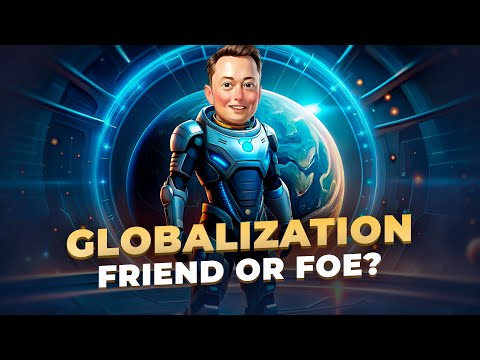
title
Hello, friends! You’re watching “Path to a
Billion.” And today is a special episode. Let’s dive into one of the most powerful forces
shaping the modern world—globalization. Yes, it’s that thing that lets you order pizza from
an Italian restaurant, use a Chinese smartphone, and sip on Brazilian coffee. Sound
familiar? But let’s break down what globalization really is and what pros and
cons it has brought us. Ready? Let’s go! What is globalization? Globalization is the process that’s making
the world smaller…
Well, not literally, of course. It means that thanks to advancements
in technology and international trade, countries, cultures, and economies are
becoming interconnected. In other words, ideas or products from one side of the world can
directly impact what’s happening in your own home. The pros of globalization Let’s start with the positive. Here are
some significant benefits of globalization: More business opportunities: Now, any company can go international. Who
would have thought that local artisans from a small village could sell their
goods to customers in New York? Access to technology: Thanks to globalization, we have access
to the latest cutting-edge technologies. What’s developed in Silicon Valley can be used
worldwide within a few months. For example, your video game might be coded by a developer
in India, while the design is done in Sweden. Cultural exchange:
We now have the chance to learn about different cultures through music,
movies, food, and even memes.
In the past, you had to travel to Japan to try sushi,
but now it’s available on every corner! The cons of globalization
But not everything is so rosy. Globalization has also
brought its own challenges: Inequality:
Large corporations are getting richer, while small businesses can’t
always keep up with the competition. It’s like in a game where the player with all the bonuses
wins, and the newbie can’t even take a step. Loss of cultural traditions:
In the rush to follow global trends, local customs and traditions can sometimes
be lost. Did you know that some countries have stopped wearing their national
attire because "everyone wears jeans"? Environmental issues:
The rapid industrial globalization and increased transportation of goods worldwide
have heightened CO2 emissions. Turns out, your avocado toast might not be as eco-friendly
if it flew halfway across the world on a plane! Let’s take IKEA as an example.
It’s
a Swedish company, but its products are made in dozens of countries. The wood
for the furniture might come from Germany, assembly happens in Poland, and delivery is
via a Chinese cargo ship. And as a result, all of this is in your living
room—thanks, globalization! Now, let’s look at some quotes from
notable figures about globalization: "Globalization is the process of creating
a common economic space that leads to the integration of the world economy through
increasingly free movement of goods, capital, and labor… As a purely
economic process, globalization is value-neutral," says renowned economist
Deepak Lal. It’s hard to argue with that. "Globalization was invented by birds,
who have been flying around the world since ancient times," writes journalist Axel
Hacke. There’s something romantic about that! "Thanks to advances in communication
and transportation, one of the driving forces of globalization, the distances between
countries and people are rapidly disappearing," believes scholar Fethullah Gülen.
I love
the idea of bringing people together! And yes, our show is coming to an end. This is the
final episode of “Path to a Billion." Together, we’ve created an incredible story! Thank you for
being with us through it all—watching, supporting, and sharing your thoughts in the comments. We
believe many of you found our episodes useful! Now, it's time to say goodbye. See you
again soon, friends! There's more to come! Let’s go!.




 Bengali
Bengali Chinese (Simplified)
Chinese (Simplified) English
English Hindi
Hindi Indonesian
Indonesian Irish
Irish Spanish
Spanish Swedish
Swedish Turkish
Turkish